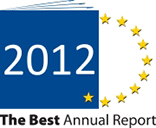

Grupa LOTOS S.A. - Integrated Annual Report 2012
4. New standards and interpretations
New standards, amendments to the existing standards and interpretations which have been adopted by the European Union (EU):
- IFRS 10 Consolidated Financial Statements (effective for periods beginning on or after January 1st 2013 – in the UE effective no later than for annual periods beginning on or after January 1st 2014),
- IFRS 11 Joint Arrangements (effective for periods beginning on or after January 1st 2013 – in the UE effective no later than for annual periods beginning on or after January 1st 2014),
- IFRS 12 Disclosure of Interests in Other Entities (effective for periods beginning on or after January 1st 2013 – in the UE effective no later than for annual periods beginning on or after January 1st 2014),
- IFRS 13 Fair Value Measurement (effective for periods beginning on or after January 1st 2013),
- IAS 27 Separate Financial Statements (2011) (effective for periods beginning on or after January 1st 2013 – in the UE effective no later than for annual periods beginning on or after January 1st 2014),
- IAS 28 Investments in Associates and Joint Ventures (2011) (effective for periods beginning on or after January 1st 2013 – in the UE effective no later than for annual periods beginning on or after January 1st 2014),
- Amendment to IAS 1 Presentation of Financial Statements – Presentation of Items of Other Comprehensive Income (effective for periods beginning on or after July 1st 2012),
- Amendments to IFRS 7 – Financial Instruments: Disclosures: Offsetting Financial Assets and Financial Liabilities (effective for annual periods beginning on or after January 1st 2013),
- Amendment to IAS 19 Employee Benefits (effective for periods beginning on or after January 1st 2013),
- IFRIC 20 Stripping Costs in the Production Phase of a Surface Mine (effective for periods beginning on or after January 1st 2013),
- Amendments to IAS 12 Deferred Tax: Recovery of Underlying Assets (effective for annual periods beginning on or after January 1st 2012 – in the UE effective no later than for annual periods beginning on or after January 1st 2013),
- Amendments to IFRS 1 First-Time Adoption of International Financial Reporting Standards: Severe Hyperinflation and Removal of Fixed Dates for First-time Adopters (effective for periods beginning on or after July 1st 2011 – in the UE effective no later than for annual periods beginning on or after January 1st 2013),
- Amendments to IAS 32 Financial Instruments: Presentation: Offsetting Financial Assets and Financial Liabilities (effective for annual periods beginning on or after January 1st 2014).
- Amendments to IFRS 1 First-Time Adoption of International Financial Reporting Standards: Government Loans (effective for annual periods beginning on or after January 1st 2013).
New standards, amendments to existing standards and their interpretations which have not been adopted by the European Union:
- IFRS 9 Financial Instruments: Classification and Measurement (effective for periods beginning on or after January 1st 2015),
- Amendments introduced as part of the Improvements to IFRSs (published in May 2012) (effective for annual periods beginning on January 1st 2013),
- Amendments to IFRS 10, IFRS 11 and IFRS 12 Transition Guidance (effective for annual periods beginning on or after January 1st 2013),
- Amendments to IFRS 10, IFRS 12 and IAS 27 Investment Entities (effective for annual periods beginning on or after January 1st 2014).
By the date of approval of these consolidated financial statements, the first phase of IFRS 9 Financial Instruments: Classification and Measurement (effective for annual periods beginning on or after January 1st 2015), had not been endorsed by the European Union. During the next phases, the International Accounting Standards Board will focus on hedge accounting and impairment. Implementation of the first phase of IFRS 9 will have an effect on the classification and measurement of the Group’s financial assets. The Group will analyse this effect along with the effect from the other phases of the project after their publication, in order to present a coherent picture.
The Group has not opted for early application of any of the standards, interpretations, or amendments which have been published but have not yet become effective.
The Company's Management Board is analysing and assessing the effect of the new standards and interpretations on the accounting policies applied by the Group and on the Group’s future financial statements.
In the opinion of the Company’s Management Board, the amendments to IAS 19 Employee Benefits have no material impact on the accounting policies applied by the Group and thus on the Group’s future financial statements prepared for the period beginning on or after January 1st 2013.
As of January 1st 2014, the Group intends to apply the following set of standards: IFRS 10 Consolidated Financial Statements, IFRS 11 Joint Arrangements, IFRS 12 Disclosure of Interests in Other Entities, IFRS 13 Fair Value Measurement, IAS 27 Separate Financial Statements and IAS 28 Investments in Associates and Joint Ventures. The method of proportionate consolidation applied by the Group in respect of UAB Minijos Nafta, controlled jointly by AB Geonafta, is expected to change to the equity method for financial statements prepared for periods beginning after December 31st 2013.

 E-mail
E-mail Facebook
Facebook Google+
Google+ Twitter
Twitter
